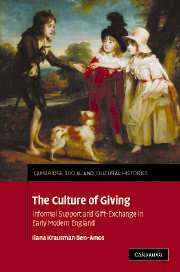Book contents
- Frontmatter
- Contents
- List of illustrations
- List of tables
- Acknowledgements
- List of abbreviations
- Introduction
- Part I Social spaces and reciprocities
- 1 Parents and offspring
- 2 Networks of support
- 3 Parishes, guilds and associations
- 4 The charitable gift
- Part II The economy of giving
- Part III The state, markets and gifts
- Conclusion
- Bibliography
- Index
1 - Parents and offspring
Published online by Cambridge University Press: 04 May 2010
- Frontmatter
- Contents
- List of illustrations
- List of tables
- Acknowledgements
- List of abbreviations
- Introduction
- Part I Social spaces and reciprocities
- 1 Parents and offspring
- 2 Networks of support
- 3 Parishes, guilds and associations
- 4 The charitable gift
- Part II The economy of giving
- Part III The state, markets and gifts
- Conclusion
- Bibliography
- Index
Summary
The locus of informal support and a range of material and emotional gifts was the nuclear family. It has long been believed that families in the past were the wellspring of giving and support, but opinions differed (and at times were hotly debated) regarding the form and structure within which these took shape. In his magisterial account of the history of the family, Lawrence Stone had famously connected familial obligations to the parental control of resources, patterns of land transfer and the family's patriarchal structure. This structure, he claimed, became particularly potent in the period between the mid-sixteenth and the early seventeenth centuries. Other historians held an opposing perspective and postulated a different set of familial relations that sustained the support of parents for their offspring. According to Alan Macfarlane, who made the strongest claims in this vein, the parent–child nexus was governed by parental devotion and selfless love; this was evident in the large investment parents made in their children, for which they expected no future reciprocation. The findings of historical demography served to confirm Macfarlane's views of the sacrifices that governed parental giving. It has been shown that the English family was small and children left the parental home early on in their lives to become servants and apprentices in the households of others. Generational interactions slackened as the children matured; while parental obligations to help their children remained strong, those pertaining to filial support of the parents were minimal, if they existed at all.
- Type
- Chapter
- Information
- The Culture of GivingInformal Support and Gift-Exchange in Early Modern England, pp. 17 - 44Publisher: Cambridge University PressPrint publication year: 2008

